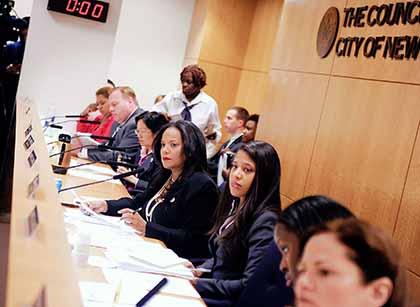By Rebecca Henely
Latina teenagers need mental and emotional care that is sensitive to their cultural needs and involves their families, health care professionals said at a City Council committee hearing aimed at how to prevent the high rate of suicide in this segment of society.
“These young women feel isolated, powerless and stuck in-between two cultures,” Councilwoman Julissa Ferreras (D-East Elmhurst) said.
The hearing was held Monday by the Council’s Women’s Issues Committee, of which Ferreras is the chairwoman. Ferreras said 11 percent of Latina teenagers attempt suicide in the United States, referencing a Youth Risk Behavioral Survey by the federal Center for Disease Control.
Lily Tom, of the city Department of Health, said that while the teen years were a time of heightened mental health problems, intergenerational conflict was often a source of suicide and self-harm. She said the department had tried to reach out to teens and latina teens through school programs and through the Internet, as well as through its Lifenet information and referral hotline, which is available in English, Spanish and Chinese. She said the department was piloting additional programs and trying to do outreach through family information centers to bring family dynamics into care.
“We also want to increase the cultural competence of the staff and department as well,” Tom said.
Dr. Rosa Gil, creator and director of the nonprofit group Communilife, which recently launched an anti-suicide initiative for young girls called “Life Is Precious” in the Bronx, said cultural competence was important and Latina teens need clinical mental health care that incorporates their cultural values and norms. She also recommended family therapy and research into developing critical strategies for reaching Latina teens.
Gil said a public education campaign must be launched so these young women know about services available to them. She also said parents need to watch their children’s moods, especially any sudden changes such as in sleeping or eating.
“There are patterns of behaviors that parents need to notice,” she said.
Roberto Lewis-Fernandez, the director of the New York State Psychiatric Institute’s Center of Excellence for Cultural Competence, said churches and community organizations should reach out to Latina teens. He also suggested trying to identify and help young Latinas at risk who come into the health system through the emergency room or social services.
“Often these young women are seen somewhere in the system but are often lost,” Lewis-Fernandez said.
A young woman from Mexico who testified and asked to be identified only as “Miss D” said her depression and former history of cutting for self-mutilation had their roots in her feeling like an outsider when she came to the city at the age of 7.
“I used to think about killing myself all the time,” she said.
Miss D said she received help when her mother found out about her problem and took her to the hospital.
Ferreras thanked Miss D for her testimony.
“As a Latina, I’m very proud of you and know that you have a very bright future,” Ferreras said.
Reach reporter Rebecca Henely by e-mail at rhenely@cnglocal.com or by phone at 718-260-4564.


































